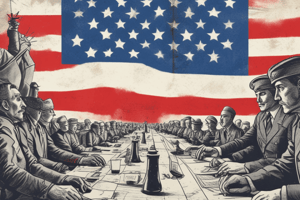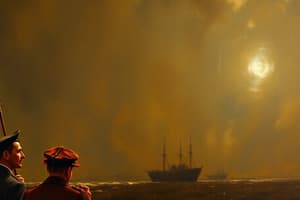Podcast
Questions and Answers
What was the primary ideological difference between the USA and the USSR during the Cold War?
What was the primary ideological difference between the USA and the USSR during the Cold War?
- The USA supported totalitarianism, while the USSR focused on freedom.
- The USA was a monarchy, while the USSR was a democracy.
- The USA promoted socialism, while the USSR adhered to liberalism.
- The USA valued capitalism and democracy, while the USSR embraced communism. (correct)
What theory suggested that the spread of communism in one country could lead to its spread in neighboring countries?
What theory suggested that the spread of communism in one country could lead to its spread in neighboring countries?
- The Expansion Theory
- The Containment Theory
- The Domino Theory (correct)
- The Isolation Theory
Which event marked the USA's first significant military involvement in the Cold War?
Which event marked the USA's first significant military involvement in the Cold War?
- The Cuban Missile Crisis
- The Berlin Blockade
- The Vietnam War
- The Korean War (correct)
What was a key outcome of the Korean Armistice Agreement in 1953?
What was a key outcome of the Korean Armistice Agreement in 1953?
What motivated the USA's desire to contain communism, particularly in terms of security?
What motivated the USA's desire to contain communism, particularly in terms of security?
Which country did the USA intervene in during the Korean War?
Which country did the USA intervene in during the Korean War?
What characterized the situation in Korea after the Korean War?
What characterized the situation in Korea after the Korean War?
What was the US's stance on communist expansion after the Korean War?
What was the US's stance on communist expansion after the Korean War?
Who was the leader of the Cuban government established after the revolution in 1959?
Who was the leader of the Cuban government established after the revolution in 1959?
What was the outcome of the Bay of Pigs Invasion?
What was the outcome of the Bay of Pigs Invasion?
What was the primary concern of the US regarding its involvement in Vietnam?
What was the primary concern of the US regarding its involvement in Vietnam?
What event prompted the US Congress to pass the Gulf of Tonkin Resolution?
What event prompted the US Congress to pass the Gulf of Tonkin Resolution?
What strategy did President Nixon introduce to address the Vietnam War?
What strategy did President Nixon introduce to address the Vietnam War?
What critical event in 1962 escalated tensions between the US and the USSR?
What critical event in 1962 escalated tensions between the US and the USSR?
Which agreement officially ended direct American involvement in the Vietnam War?
Which agreement officially ended direct American involvement in the Vietnam War?
What was a significant limitation of US power revealed by the Vietnam War?
What was a significant limitation of US power revealed by the Vietnam War?
What was the main result of the Cuban Missile Crisis negotiations?
What was the main result of the Cuban Missile Crisis negotiations?
What was the impact of the Tet Offensive on American public opinion regarding the Vietnam War?
What was the impact of the Tet Offensive on American public opinion regarding the Vietnam War?
Flashcards
Domino Theory
Domino Theory
The idea that if one country falls to communism, neighboring countries will also fall.
Truman Doctrine
Truman Doctrine
US policy to contain communism by preventing its spread, especially due to poverty or instability.
Korean War
Korean War
A war in Korea (1950-1953) where the US led a UN coalition to stop North Korea's communist invasion of South Korea.
38th Parallel
38th Parallel
Signup and view all the flashcards
Demilitarized Zone (DMZ)
Demilitarized Zone (DMZ)
Signup and view all the flashcards
Containment Policy
Containment Policy
Signup and view all the flashcards
Communist Dictatorship
Communist Dictatorship
Signup and view all the flashcards
Capitalist Democracy
Capitalist Democracy
Signup and view all the flashcards
Who overthrew Batista?
Who overthrew Batista?
Signup and view all the flashcards
Bay of Pigs Invasion
Bay of Pigs Invasion
Signup and view all the flashcards
Cuban Missile Crisis
Cuban Missile Crisis
Signup and view all the flashcards
Gulf of Tonkin Incident
Gulf of Tonkin Incident
Signup and view all the flashcards
Gulf of Tonkin Resolution
Gulf of Tonkin Resolution
Signup and view all the flashcards
Tet Offensive
Tet Offensive
Signup and view all the flashcards
Vietnamization
Vietnamization
Signup and view all the flashcards
Paris Peace Accords
Paris Peace Accords
Signup and view all the flashcards
Study Notes
Containment Policy: US Response to Communism
- The US and USSR held opposing ideologies, with the US a capitalist democracy and the USSR a communist dictatorship. The US viewed communism as a threat to freedom and capitalism.
- The Truman Doctrine emphasized containing communism to prevent its spread in areas vulnerable to instability.
- The Domino Theory predicted the potential for communist takeover of neighboring countries if one fell to communism, prompting US intervention.
- Security concerns over Soviet expansion motivated US efforts to contain communism globally.
Korean War (1950-1953)
- Korea was divided after WWII into communist North and non-communist South.
- North Korea, backed by the USSR, invaded South Korea to unify the country under communism.
- US, fearing communist expansion, led a UN coalition to defend South Korea.
- The war resulted in a stalemate and an armistice establishing a DMZ.
- This conflict demonstrated the US's commitment to containing communism in Asia.
Cuba (1959-1962)
- Fidel Castro's communist revolution ousted the US-backed Batista regime.
- The Bay of Pigs invasion, a failed US-backed attempt to overthrow Castro, damaged US credibility and strengthened Castro's ties with the USSR.
- The Cuban Missile Crisis saw the US discover Soviet nuclear missiles in Cuba, leading to a tense standoff.
- The crisis ended with the removal of missiles from both Cuba and Turkey.
- This event highlighted the nuclear brinkmanship and the US's dedication to containment in the Americas.
Vietnam War (1955-1975)
- Post-French defeat, Vietnam was divided at the 17th parallel, with communist North Vietnam and non-communist South Vietnam.
- The US supported South Vietnam to prevent communist expansion in Southeast Asia.
- The Gulf of Tonkin Incident was a catalyst for increased US military involvement.
- The US faced significant challenges and resistance in Vietnam, leading to widespread public opposition.
- The Tet Offensive exposed the limitations of US power and the unpopularity of the war.
- Vietnamization was a strategy to reduce US involvement and shift responsibility to South Vietnam.
- The Paris Peace Accords ended direct US involvement, but not the conflict.
- The US's failure in Vietnam contributed to disillusionment regarding containment policies.
Studying That Suits You
Use AI to generate personalized quizzes and flashcards to suit your learning preferences.





